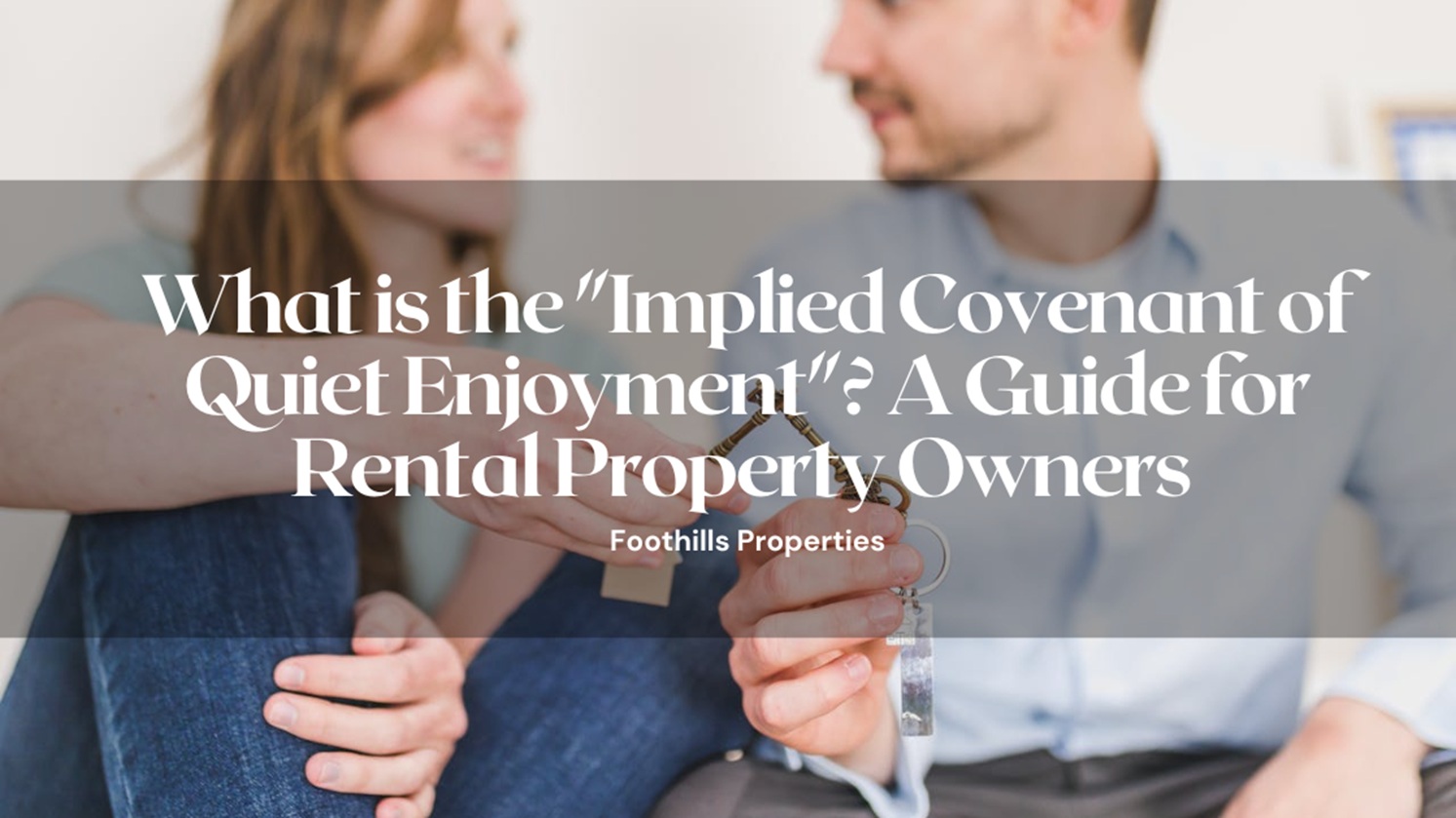
As a rental property owner, you're likely familiar with lease agreements, rent collection, and property maintenance.
But one concept that often goes unnoticed—yet plays a crucial role in landlord-tenant relationships—is the implied covenant of quiet enjoyment.
It’s a foundational right for every renter and a significant responsibility for every landlord. Understanding this covenant can protect you from legal disputes and help you create a more stable and profitable rental business.
In today’s article, Foothills Properties will explain what the covenant of quiet enjoyment is, why it matters, and how landlords can uphold it.
Understanding the Implied Covenant of Quiet Enjoyment
The implied covenant of quiet enjoyment is a legal promise automatically included in every residential lease agreement, whether it's written or verbal. It guarantees the tenant's right to possess and peacefully enjoy the property without unreasonable interference.
Importantly, this "quiet enjoyment" isn’t limited to actual noise—it refers more broadly to a tenant’s right to live in a space without disturbances that infringe on their use and enjoyment of the rental. This covenant is implied by law in most states, meaning landlords must uphold it by default.
What the Covenant Covers
The covenant of quiet enjoyment covers a wide range of tenant rights. For example, it assures that the tenant won’t be unlawfully evicted or excessively disturbed by the landlord or other parties.

Here are some examples of what might fall under this covenant:
Unauthorized and repeated landlord entry into the property without notice.
Disruption of basic utilities like water, heat, or electricity.
Excessive noise or harassment from other tenants that the landlord fails to address.
Construction or renovations that are disruptive and not properly managed.
Allowing common areas to fall into disrepair creates unsafe or unpleasant conditions.
Why It Matters for Landlords
Violating the implied covenant of quiet enjoyment can lead to legal consequences. Tenants may have the right to:
Withhold rent.
Move out before the lease ends without penalty.
Sue the landlord for damages.
File complaints with local housing authorities.
Beyond the legal risks, breaching this covenant often results in strained relationships with tenants and a high turnover rate, which ultimately impacts your bottom line.
By understanding and honoring the covenant, you not only stay compliant with the law but also build trust with your tenants and improve your property’s long-term success.
Common Violations to Watch Out For
Entering the Property Without Proper Notice
Even if you own the property, tenants have the right to privacy. Laws generally require landlords to give at least 24-hour notice before entering, unless it’s an emergency. Regular unannounced visits are seen as intrusive and may be grounds for legal complaints.

Failure to Address Nuisances or Safety Hazards
If another tenant in a multi-unit building is creating noise, smoking indoors, or causing safety concerns, and the landlord fails to intervene, it could be considered a breach. Similarly, if pests, mold, or broken locks go unaddressed, the tenant’s right to safely enjoy the property is affected.
Neglecting Essential Repairs
A broken heater in the winter or a leaking roof during rainy seasons not only affects habitability but also infringes on the tenant’s ability to live peacefully and comfortably in the unit.
Overbearing Rules and Restrictions
Excessive surveillance, restrictions on guest visits, or unreasonable curfews imposed by landlords may also be seen as interfering with the tenant’s right to enjoy the space.
How to Uphold the Covenant as a Landlord
Upholding the implied covenant of quiet enjoyment doesn’t have to be complicated. It comes down to respecting your tenant’s space, responding to issues promptly, and maintaining the property to acceptable living standards.
Ensure you:
Provide adequate notice before entering the property.
Respond quickly to repair requests and maintenance issues.
Enforce building rules fairly and consistently.
Address complaints of noise or harassment from neighbors.
Avoid unnecessary construction or disruptive activities without proper communication.
What Tenants Can Do If the Covenant is Violated
If a tenant feels that their right to quiet enjoyment is being violated, they will likely approach you first with their concerns.
When handled professionally, many situations can be resolved quickly. However, if the issue persists or the landlord is unresponsive, the tenant may choose to take legal action.

To prevent this from happening, always document communication, issue receipts or confirmation for repair requests, and keep a maintenance log. These actions help show good faith and can serve as a record if disputes ever arise.
The Role of a Professional Property Management Company
Maintaining the covenant of quiet enjoyment can be a challenge, especially for landlords who own multiple properties or live far from their rental units. That’s where working with a professional property management company like Foothills Properties can make all the difference.
A good property manager acts as a buffer between you and the tenant, ensuring that all legal and operational aspects are handled efficiently. They have systems in place to:
Respond to maintenance issues promptly.
Coordinate with reliable contractors and vendors.
Handle tenant complaints professionally and legally.
Monitor lease compliance and manage noise or behavior violations.
Keep detailed records of tenant communication and property upkeep.
Because property managers are well-versed in local landlord-tenant laws, they can help you avoid legal pitfalls and maintain compliance with implied and written covenants. This translates to happier tenants, fewer vacancies, and a smoother rental operation overall.
Hiring a management company also allows you to focus on your investment strategy and long-term goals, while day-to-day tasks are taken care of by experienced professionals. It's peace of mind for both landlords and residents.
Final Thoughts
The implied covenant of quiet enjoyment is a legal guarantee that protects tenants’ rights to use and enjoy their rental property in peace. For landlords, understanding and upholding this covenant is essential not only for legal compliance but also for fostering positive, long-term tenant relationships.
If managing these expectations feels overwhelming, partnering with a trusted property management company like Foothills Properties can be one of the smartest moves you make for your rental business.








